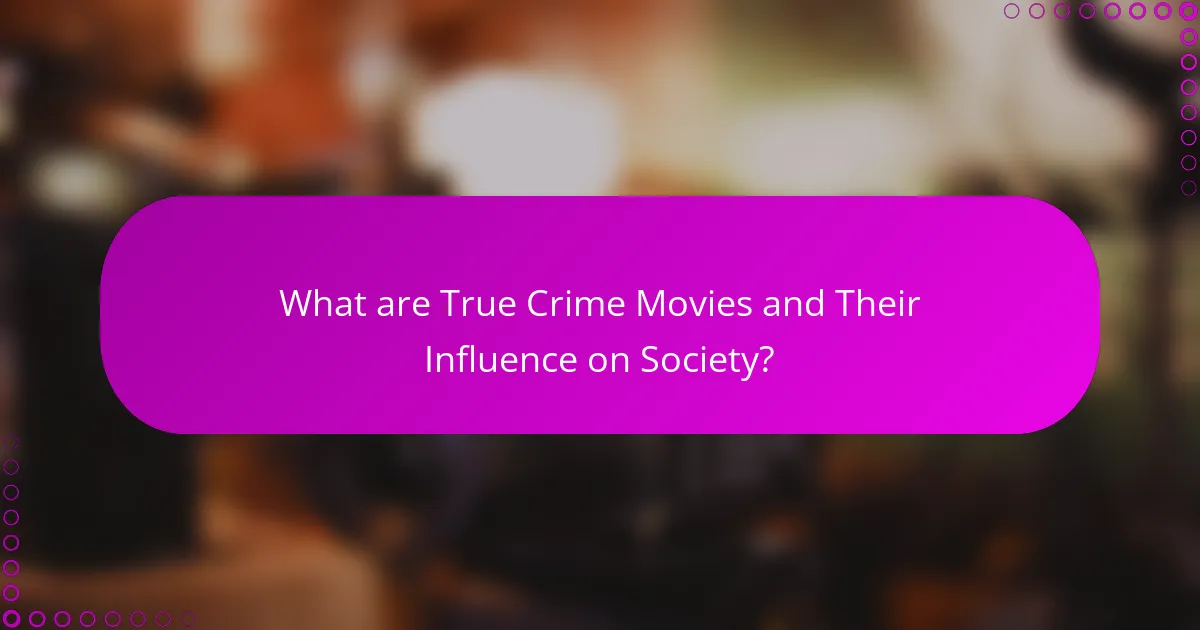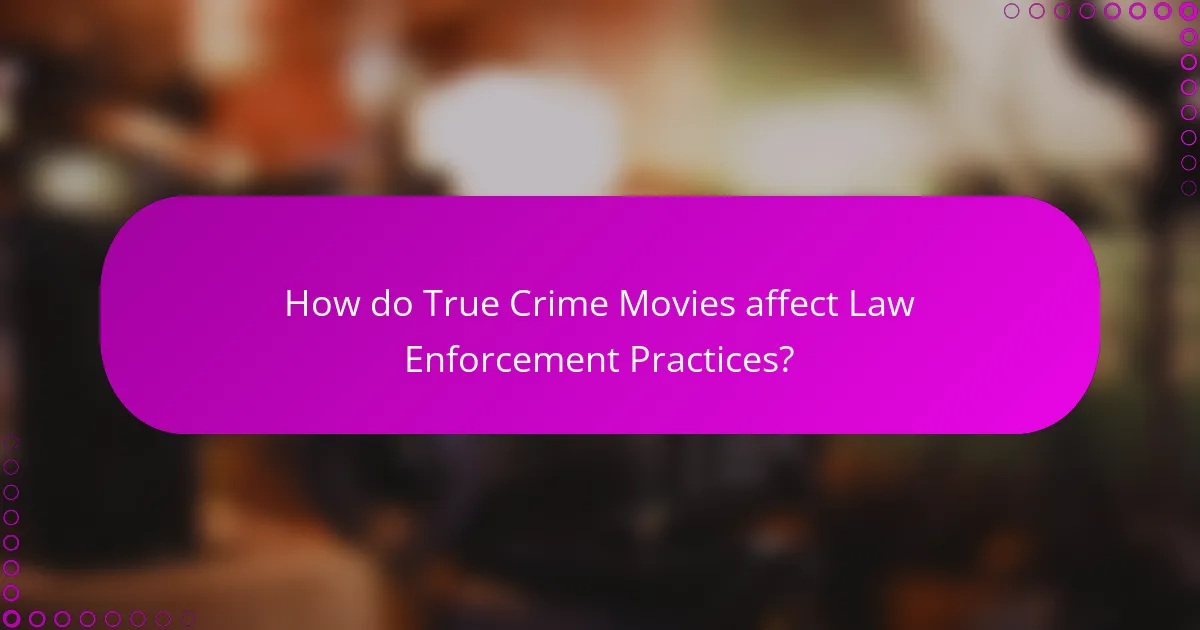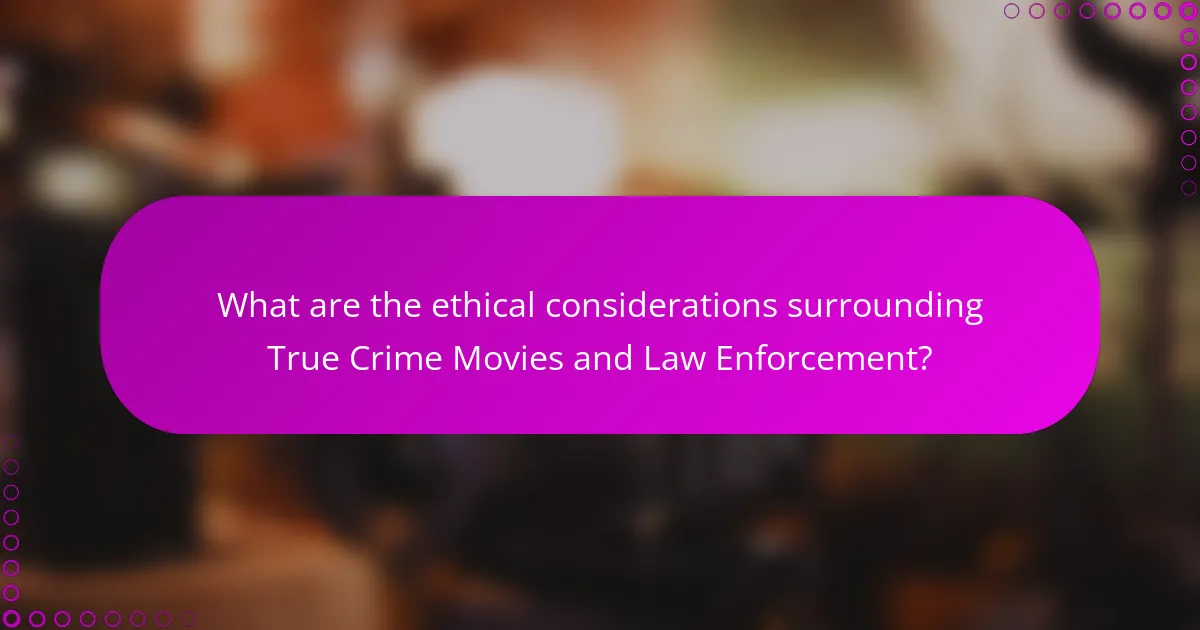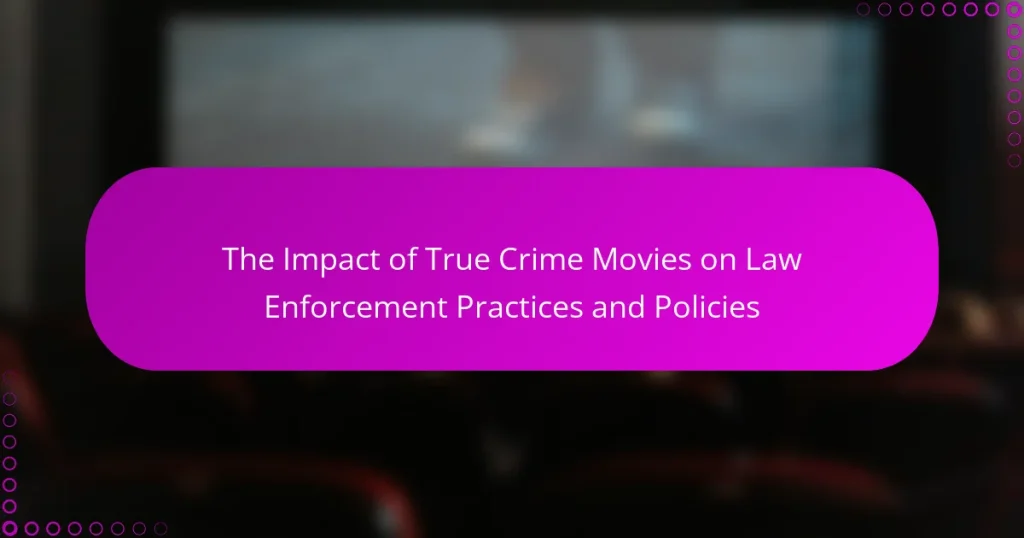True crime movies are films that dramatize real-life criminal events and investigations, significantly influencing public perceptions of crime, justice, and law enforcement practices. These films often portray notorious crimes and their legal proceedings, leading to increased awareness of criminal behavior and the complexities involved in law enforcement. The portrayal of criminal investigations in true crime movies can create pressure on law enforcement agencies, affecting their operational approaches and prioritization of cases. Ethical considerations arise from the sensationalization of violence and the potential exploitation of victims, which can skew public understanding of law enforcement realities and impact juror biases. Overall, true crime movies create a feedback loop that shapes societal views on crime and the effectiveness of legal systems.

What are True Crime Movies and Their Influence on Society?
True crime movies are films that dramatize real-life criminal events and investigations. They often portray notorious crimes and the subsequent legal proceedings. These movies influence society by shaping public perceptions of crime and justice. They can increase awareness of criminal behavior and the complexities of law enforcement. Studies show that true crime media can lead to heightened fear of crime among viewers. Additionally, they may impact people’s understanding of legal processes and criminal psychology. True crime movies can also inspire discussions about morality and ethics in society. Their popularity often leads to increased interest in actual criminal cases and law enforcement practices.
How do True Crime Movies shape public perception of crime?
True crime movies shape public perception of crime by dramatizing real criminal cases. They often highlight specific aspects of crime, such as violence and criminal psychology. This portrayal can lead to heightened fear of crime among viewers. Research shows that exposure to true crime media correlates with increased anxiety about personal safety.
Additionally, these films can skew public understanding of crime statistics. They may emphasize sensational cases, leading to misconceptions about crime prevalence. For instance, a study published in the journal “Crime & Delinquency” found that media representations can distort perceptions of risk and victimization. True crime movies can also influence viewers’ attitudes towards law enforcement. They may create expectations for police procedures that do not reflect reality. Overall, true crime movies significantly impact how the public perceives crime and justice.
What psychological effects do True Crime Movies have on viewers?
True crime movies can induce a range of psychological effects on viewers. These films often evoke heightened emotions, including fear and anxiety, due to their depiction of real-life crimes. Viewers may experience a fascination with the criminal mind, leading to increased interest in criminal psychology.
Research indicates that exposure to true crime can result in desensitization to violence. A study published in the journal “Psychology of Popular Media” found that frequent viewers of violent media may become less sensitive to real-world violence.
Additionally, true crime movies can create a sense of social awareness about crime and safety. Some viewers report feeling more vigilant and cautious in their daily lives after watching these films.
Overall, true crime movies impact viewers psychologically by influencing their emotions, perceptions of safety, and understanding of criminal behavior.
In what ways do True Crime Movies impact community discussions about crime?
True crime movies significantly impact community discussions about crime by raising awareness and stimulating dialogue. They often highlight real-life cases, prompting viewers to engage with the complexities of criminal behavior. These films can influence public perception of crime rates and safety in communities. According to a study by the University of Southern California, true crime media increases interest in criminal justice topics among audiences. Discussions sparked by these films can lead to calls for policy changes or increased law enforcement scrutiny. Additionally, they may encourage community members to participate in crime prevention initiatives. The emotional narratives presented in these movies resonate with viewers, making crime a personal concern. This engagement can foster a sense of community responsibility regarding crime and safety.
Why are True Crime Movies popular among audiences?
True crime movies are popular among audiences due to their compelling narratives and psychological intrigue. They provide a deep dive into real-life criminal cases, which fascinates viewers. Audiences are drawn to the suspense and drama that these films offer. The exploration of criminal psychology captivates many, as it reveals the motives behind heinous acts. Additionally, true crime movies often include elements of mystery and investigation. This engages viewers who enjoy solving puzzles and uncovering truths. Statistics show that true crime content has surged in popularity, with streaming platforms reporting high viewership numbers. For instance, Netflix’s “Making a Murderer” attracted 19 million viewers in its first month. Such data underscores the significant interest in this genre.
What factors contribute to the appeal of True Crime Movies?
True crime movies appeal to audiences due to their engaging storytelling and real-life connections. These films often explore the psychology of crime, which intrigues viewers. They provide insights into criminal behavior and law enforcement processes. The element of suspense keeps viewers on the edge of their seats. True crime movies also spark discussions about morality and justice. They allow audiences to confront their fears in a safe environment. Additionally, the fascination with the macabre draws people in. A study from the Journal of Criminal Justice found that true crime content increases public interest in crime-related issues.
How do True Crime Movies compare to other genres in terms of viewership?
True crime movies generally attract higher viewership compared to many other genres. This genre has seen significant growth in popularity, particularly in the last decade. According to a 2021 report by the Pew Research Center, 36% of U.S. adults stated they watch true crime content regularly. In contrast, traditional genres like romance or comedy have lower engagement rates. For example, a 2020 survey indicated that only 22% of viewers preferred romantic films. True crime documentaries and films often draw large audiences on streaming platforms, surpassing other genres. Netflix reported that true crime series are among their most-watched content. This trend reflects a cultural fascination with crime stories and their real-life implications.

How do True Crime Movies affect Law Enforcement Practices?
True crime movies influence law enforcement practices by shaping public perception and expectations. They often dramatize criminal investigations, which can lead to increased pressure on law enforcement agencies. This pressure may result in prioritizing certain cases that gain media attention. Additionally, these films can affect the way police approach investigations, emphasizing techniques that resonate with audiences. For instance, popular techniques showcased in films may lead to their adoption in real-life investigations. Research indicates that public interest in true crime can lead to higher reporting of crimes and increased community involvement. The portrayal of law enforcement in these films can also impact recruitment and training practices within agencies. Ultimately, true crime movies create a feedback loop that affects how law enforcement operates in society.
What changes in investigative techniques have been influenced by True Crime Movies?
True crime movies have influenced investigative techniques by popularizing forensic science and psychological profiling. These films often emphasize the importance of evidence collection and analysis. As a result, law enforcement agencies have adopted more rigorous forensic methods. The portrayal of detectives utilizing behavioral analysis has also led to increased training in criminal psychology. Additionally, true crime narratives have raised public awareness about investigative processes. This heightened interest has encouraged agencies to improve transparency and community engagement. Studies show that public fascination with these films can lead to increased funding for investigative resources.
How do True Crime Movies inspire new methods of crime-solving?
True crime movies inspire new methods of crime-solving by popularizing investigative techniques and raising public awareness. These films often depict real cases, showcasing how detectives use forensic science and psychological profiling. This portrayal encourages law enforcement to adopt similar methods in their investigations. For example, the success of series like “Making a Murderer” has led to renewed interest in cold cases. Additionally, true crime narratives can motivate viewers to engage with law enforcement, providing tips or information. Research indicates that public interest in true crime can lead to increased funding for forensic technology. This funding allows agencies to implement advanced investigative tools, enhancing their crime-solving capabilities.
What role do True Crime Movies play in the training of law enforcement personnel?
True crime movies serve as a supplemental training tool for law enforcement personnel. They provide realistic portrayals of criminal investigations and legal processes. These films can enhance understanding of criminal psychology and investigative techniques. Law enforcement can analyze decision-making processes depicted in these movies. This analysis helps officers reflect on their own practices. Studies indicate that visual learning aids retention of information. True crime movies can stimulate discussions on ethical dilemmas in policing. Overall, they contribute to ongoing education and professional development in law enforcement.
How do True Crime Movies impact public policy related to crime?
True crime movies significantly influence public policy related to crime. They shape public perception of crime, leading to increased pressure on policymakers. For example, sensationalized portrayals can prompt calls for tougher laws or reforms. Research indicates that such films often highlight specific crimes, which can lead to legislative changes. In some cases, they have sparked discussions on criminal justice reform and victim rights. The portrayal of law enforcement in these films can also affect funding and resource allocation for police departments. Overall, true crime movies serve as a catalyst for public discourse on crime policy.
What legislative changes have been prompted by the popularity of True Crime Movies?
Legislative changes prompted by the popularity of True Crime Movies include increased scrutiny of wrongful convictions. This scrutiny has led to the implementation of laws aimed at improving forensic science standards. States like California have enacted legislation requiring the use of best practices in evidence collection. Additionally, some jurisdictions have introduced laws to enhance transparency in police investigations. The popularity of these films has also sparked discussions about victims’ rights legislation. Changes in public perception have influenced lawmakers to consider reforms in criminal justice policies. These reforms often aim to address issues highlighted in True Crime narratives. Overall, True Crime Movies have played a role in shaping legislative priorities related to criminal justice.
How do True Crime Movies influence funding for law enforcement initiatives?
True crime movies can influence funding for law enforcement initiatives by raising public awareness and interest in crime-related issues. Increased viewer engagement often leads to heightened demand for resources dedicated to law enforcement. For example, a surge in viewership can prompt local governments to allocate more budget towards police departments. Additionally, these films can highlight specific societal issues, prompting community advocacy for funding. According to a study by the Pew Research Center, 61% of viewers believe that true crime stories should lead to more funding for law enforcement. This demonstrates a direct correlation between media portrayal and public perception of funding needs.

What are the ethical considerations surrounding True Crime Movies and Law Enforcement?
True crime movies raise significant ethical considerations regarding their portrayal of law enforcement. These films often dramatize real criminal cases, impacting public perception of police work. They may sensationalize violence and criminality, leading to misconceptions about the realities of law enforcement. Ethical concerns also arise from the potential exploitation of victims and their families for entertainment purposes. Additionally, these movies can influence juror biases, affecting the justice process. Studies indicate that dramatized portrayals can lead to increased fear of crime among viewers. This fear may result in unrealistic expectations of law enforcement effectiveness. Therefore, the ethical implications of true crime movies are multifaceted and warrant careful examination.
How do True Crime Movies affect the portrayal of victims and suspects?
True crime movies significantly influence the portrayal of victims and suspects. They often sensationalize crime narratives, which can distort public perception. Victims are frequently depicted as one-dimensional characters, reducing their complexity and humanity. This oversimplification can lead to victim-blaming in real-life situations.
Suspects, on the other hand, are often portrayed with exaggerated traits, reinforcing stereotypes. This can create biases in public opinion and even affect jury decisions. Research shows that media representations shape societal attitudes toward crime and justice. A study by the American Psychological Association found that dramatizations can lead to misconceptions about the nature of crime and the criminal justice system.
Overall, true crime movies can skew the understanding of both victims and suspects, impacting societal beliefs and law enforcement practices.
What are the potential consequences of dramatizing real-life crimes?
Dramatizing real-life crimes can lead to various potential consequences. One significant consequence is the distortion of facts, which can misinform the public. This misinformation can create misconceptions about crime rates and law enforcement effectiveness. Additionally, dramatizations may lead to increased fear among viewers, influencing their perception of safety.
Another consequence is the potential for victimization of real-life individuals involved in the crime. Families of victims may experience renewed trauma due to the dramatization. Furthermore, dramatizations can impact ongoing investigations by influencing public opinion and jury pools.
Research has shown that sensationalized portrayals can also lead to copycat crimes. This phenomenon occurs when individuals emulate behaviors seen in dramatized narratives. Overall, the dramatization of real-life crimes can significantly alter public perception, impact victims, and influence criminal behavior.
How can filmmakers balance storytelling with ethical responsibility?
Filmmakers can balance storytelling with ethical responsibility by prioritizing accuracy and sensitivity in their narratives. They should conduct thorough research to ensure factual representation of events and individuals involved. Engaging with affected communities can provide valuable perspectives and foster respect. Filmmakers should also consider the potential impact of their portrayals on public perception and law enforcement practices. For instance, true crime films can influence how audiences view justice and crime, which may affect real-world attitudes. Ethical guidelines, such as those from the International Documentary Association, can help filmmakers navigate these challenges. By adhering to these principles, filmmakers can create compelling stories that also uphold ethical standards.
What best practices can law enforcement adopt in response to True Crime Movies?
Law enforcement can adopt several best practices in response to true crime movies. First, they should engage in community education about the distinction between dramatization and reality. This helps to clarify misconceptions that arise from sensationalized portrayals. Second, law enforcement agencies can collaborate with filmmakers to ensure accurate representations of police procedures. This partnership can enhance public understanding of investigative processes. Third, agencies should provide training for officers on how to handle public inquiries generated by true crime media. Such training can prepare officers for increased scrutiny and questions from the community. Lastly, law enforcement can utilize the popularity of true crime content to promote crime prevention initiatives. By leveraging interest in true crime, they can effectively communicate safety messages and resources. These practices can help mitigate the negative impacts of true crime narratives while fostering a more informed public.
How can law enforcement engage with communities to address misconceptions from True Crime Movies?
Law enforcement can engage with communities by hosting educational workshops. These workshops can clarify the realities of criminal investigations. They can also address specific misconceptions portrayed in true crime movies. Law enforcement can utilize social media to share factual information. This helps to counteract misleading narratives from popular media. Community forums can be organized for open discussions and Q&A sessions. Engaging local influencers can amplify accurate messaging. Research shows that community engagement improves public trust in law enforcement.
What strategies can be implemented to use True Crime Movies for educational purposes?
True crime movies can be used for educational purposes through various strategies. Educators can incorporate these films into criminal justice curricula to illustrate real-life cases. Analyzing the narrative structure helps students understand investigative techniques. Discussions can focus on ethical implications of crime portrayal. Workshops can be organized to critique the accuracy of the films. Role-playing activities can simulate law enforcement responses based on scenarios depicted. Case studies can be developed from the films to explore legal outcomes. Collaborations with law enforcement can provide practical insights into investigative processes. These strategies enhance critical thinking and provide a deeper understanding of criminal justice systems.
True crime movies are films that dramatize real-life criminal events and investigations, significantly influencing law enforcement practices and public perception of crime. This article explores how true crime narratives shape societal attitudes towards crime, impact community discussions, and affect law enforcement techniques and policies. Key topics include the psychological effects on viewers, the portrayal of victims and suspects, and the ethical considerations surrounding these films. Additionally, the article examines how true crime media can inspire changes in investigative methods and influence public policy related to crime and safety. Overall, true crime movies play a crucial role in shaping the relationship between society and law enforcement.


